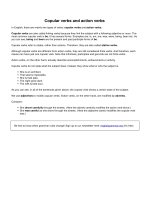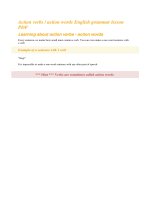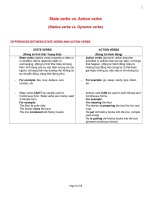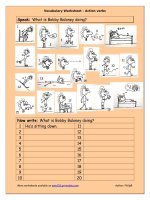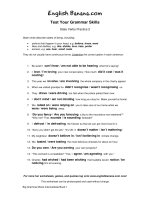State verbs vs action verbs
Bạn đang xem bản rút gọn của tài liệu. Xem và tải ngay bản đầy đủ của tài liệu tại đây (117.09 KB, 4 trang )
State verbs vs. Action verbs
(Stative verbs vs. Dynamic verbs)
DIFFERENCES BETWEEN STATE VERBS AND ACTION VERBS
STATE VERBS
-
ACTION VERBS
(Động từ tình thái / trạng thái)
State verbs (stative verbs) express a state or
a condition that is relatively static or
unchanging. (động từ tình thái miêu tả trạng
thái / tình trạng của sự vật, hiện tượng và con
người, và trạng thái này dường như không có
sự chuyển động, trạng thái đứng yên)
-
(Động từ hành động)
Action verbs (dynamic verbs) describe
activities or actions that we can take, or things
that happen. (động từ hành động miêu tả
những hoạt động mà chúng ta có thể tham
gia hoặc những sự việc xảy ra với chúng ta)
-
For example: like, love, believe, own,
contain, etc
-
For example: go, sleep, study, type, listen,
etc
-
State verbs CAN’T be usually used in
Continuous form. State verbs are mainly used
in Simple form.
For example:
The floor is quite dirty.
The farmer owns the land.
The box contained old history books.
-
Actions verb CAN be used in both Simple and
Continuous forms.
For example:
I’m cleaning the floor.
The farmer is preparing the land for his next
crop.
He put old history books into the box. (simple
past tense)
He is putting old history books into the box
(present continuous tense)
Page 1 of 4
TYPES OF STATE VERBS:
•
•
•
•
Verbs that express likes and dislikes: like, love, hate, dislike, enjoy, prefer, adore, etc
E.g:
I like writing romantic poems.
I enjoy singing and dancing with my friends at the weekend.
Verbs of perception (sự nhận thức): know, believe, understand, realize, recognize, remember,
forget, notice, think, expect, etc
E.g:
Seeing her from the distance, I realize she’s changed a lot.
I forget to send these letters to Paris.
Verbs of the senses (giác quan): see, smell, hear, taste, feel, look, sound, etc
E.g:
You look so tired. You must have had too much work at the bank.
That sounds a good idea.
John must be at home. I can see his car park outside
The soup tastes delicious.
Other verbs: contain, own, appear = seem, be, include, belong, fit, want, need, matter, cost, mean,
owe, have (=possess), require, weigh, wish, keep (=continue), consist, doubt, exist, etc
E.g:
My father owns a piece of land in the south of California.
These apples weigh 5 kilos.
“Sorry” seems to be the hardest word.
This book consists of 5 chapters by 5 different writers.
SOME STATE VERBS IN THE CONTINUOUS FORM (một số động từ tình thái sử dụng được cho dạng tiếp
diễn)
Some state verbs can be used in the continuous form if they refer to a temporary action or an action in
progress rather than a permanent state. Of course, they will have different meanings from their original ones.
(Một số động từ tình thái có thể được sử dụng với dạng tiếp diễn nếu chúng diễn tả hành động đang xảy ra,
hơn là miêu tả trạng thái, dĩ nhiên nghĩa của những động từ này sẽ khác với nghĩa gốc của nó.)
STATIVE MEANING
1
ACTIVE MEANING (ACTION)
The neighbors are having a party.
(= celebrating a party: an action in progress)
We are having dinner at the restaurant.
(= eating)
Some idioms with HAVE can be used in the
continuous form.
• Have breakfast, lunch, dinner
• Have a bath / shower / swim / party
• Have an experience
• Have a baby
• Have difficulty / fun / trouble
I have a new car.
I have a dream of being rich.
(=possess: chỉ sở hữu)
2
I think he’s from Canada.
I’m thinking about the plan.
(= believe, giving opinion)
We’re thinking about our holiday.
I don’t think you’ll pass the next exam.
(= am considering, an action in progress)
Page 2 of 4
Please be quiet! I’m thinking.
3
The soup tastes delicious.
He is tasting the soup.
(= the soup has a delicious taste, describing the
state of the soup)
I was just tasting the food.
(= testing)
In this case, we can change “taste” into “to be”
without difference in meaning.
The soup is delicious.
4
I can see some kites from the distance.
I’m seeing my doctor tomorrow. (= visiting)
What can you see?
Mark is seeing his manager. (= seeing)
(= notice with eyes)
I see what you mean. (= understand)
5
Susan looks quite tired.
John is looking out of the window.
It looks as if they have finished the job.
Susan is looking at some photos.
You look great in your new shirt.
(= an action of directing eyes towards sth/sb)
(= seem, appear)
6
This perfume smells nice.
He is smelling the roses. ( = is sniffing)
( = has a nice smell)
The cat is smelling the food. ( = is sniffing)
This perfume is nice.
The soup smells good.
( = has a good smell)
The soup is good.
7
I feel that you are so impolite with such annoying
behavior. ( = I think, giving opinion)
She is feeling the baby’s forehead. ( = is
touching)
The towel feels soft.
How have you been feeling? (= asking about
one’s physical state)
(= has a soft texture)
8
I don’t hear well.
There must have someone downstairs because I
can hear the footsteps.
The judge will be hearing the collected
evidence later this week.
( = listening to)
(= pick up with ears)
9
10
11
I expect I will pass my next exam in maths. ( =
hope)
Are you expecting your visitors from France
this evening? ( = waiting for them to arrive)
- What are you doing here?
- I’m expecting a phone call. (=waiting)
The chicken weighs 2 kilos.
He is weighing the chicken.
(= its weight is 2 kilos)
(= measuring its weight)
This dress fits you perfectly.
I’m fitting a lock to the window. (= putting in:
tra, lắp vào)
I expect that you are bored. (=assume)
(= the dress has a right size)
12
She appears very nervous.
She appeared / was appearing in a film.
Page 3 of 4
(= look, seem)
He is appearing in a new play.
(= is taking part in)
13
Jane is a very sociable person.
Andrew is being very sociable today.
He is selfish.
(just only today he behaves sociably, normally
he is not sociable)
(= describing character, permanent state) (miêu
tả tính cách, trạng thái lâu dài)
He is being selfish.
(= describing behavior, temporary situation)
(miêu tả hành vi tạm thời)
14
I love / like / enjoy parties.
I’m loving / liking / enjoying this party too
much.
I like school.
I’m liking school much better now.
Holidays cost a lot of money.
(= a permanent state, used in simple present)
This trip to Dubai is costing a lot of money.
(= a short period, used in continuous form)
Page 4 of 4

